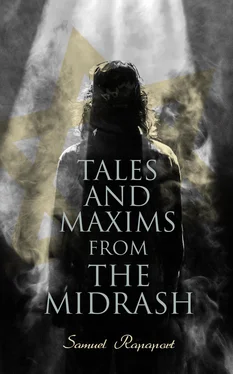The צמח ('Zemach'), mentioned by Jeremiah (23. 5) and by Zechariah (6. 12) is the Messiah.--Numb. Rabba 18.
Unlike the kings of this earth, God bestows some of His possessions and dignities upon beings of flesh and blood. He set Solomon upon His own throne (1 Chron. 29. 23). He caused Elijah to ride upon His own horse; that is to say, upon the storm and whirlwind. To Moses, He gave God's rod, and upon the head of Messiah He placed His own crown.--Exod. Rabba 8. and Tanchuma Voera.
Many and varied are the things that in the Bible are designated 'the first.' The month of the Egyptian exodus God named the first month of the year (Exod. 12. 2). He revealed Himself as 'the first' to the prophet Isaiah (44. 6). Zion, too, is styled 'the first' (Jer. 117). Of Esau also the epithet is used (Gen. 25.) And, lastly, Messiah is mentioned as 'the first' (Isa. 41. 27).
There is this intimate connexion between them, that God, who is the first, will rebuild Zion the first, and bring retribution on Esau (= Rome), known as the first, at the time of the advent of Messiah the first, in the month (= Nissan) which was appointed as the first.--Exod. Rabba 15.
Five things brought about the redemption of the Israelites from Egypt: (1) The sufferings of the people (2) their repentance; (3) the merits of their ancestors (4) the expiration of the time fixed for their captivity (5) the mercy of their God. These same causes will operate towards the realization of Israel's Messianic hopes and lead to the last redemption through Messiah.--Deut. Rabba 2.
There will be a great difference between the Egyptian and the last redemption. 'When you were delivered from Egypt,' says God to Israel, 'you had to depart in haste; at the last deliverance you shall not go in haste nor by Right, (Isa. 52. 12). At the Egyptian deliverance I, in my manifestation, went before you (Exod. 13. 21). At the last deliverance 'the Lord will go before you and the God of Israel will be your reward.' (Isa. 52. 12).--Exod. Rabba 19.
'All your former redemptions,' God says to Israel, have been accomplished through the instrumentality of men, and were, consequently, not lasting in their effect. You were delivered from Egypt through Moses and Aaron; you were rescued out of the hands of Sisera by Deborah and Barak; from the power of Midian you were saved by Shamgar. I myself will be your last and your everlasting Redeemer.'--Tanchuma Achray.
Great chariots, precious stones and other valuable gifts will the nations bring to Messiah. This means that the nations will bring Israel as a present to Messiah.--Midr. Song of Songs 4.
Just as Judah, though not the eldest, had always precedence of Reuben and the other tribes (as is to be seen in various parts of the Bible--Numbers 2. 3, 2. 9, 7. 12; Judges 1. 2, 20. 18), so he will have precedence in announcing the coming of Messiah, as foretold by the prophet Nahum (1. 15).--Numb. Rabba 2.
To Judah were revealed all the great men and what will happen to them from the time of Jacob till the coming of Messiah.--Numb. Rabba 13.
The perpetual light in the Mishkan was typical of the light of King Messiah.--Levit. Rabba 31.
All the gifts which Jacob felt himself constrained--out of fear--to present to Esau, will be restored to Israel at the advent of Messiah.--Gen. Rabba 75.
Moses, the first redeemer, rode on an ass, gave the Israelites manna for food, and brought up the water. So also shall Messiah be seen riding on an ass (Zech. 9), shall bring down manna from on high (Ps. 70. 16), and cause the rivers of Judah to flow with water (Joel 4. 18).--Midr. Eccles. 1.
'The envy of Ephraim shall depart and the adversaries of Judah shall be cut off' (Isa. 11. 13). That means that amongst the Jews themselves, at the time of Messiah, there will be perfect peace and harmony.--Tanchuma Vayeegash.
There is no redemption without faith.--Tanchuma Beshallach.
Three things Israel despised, viz., the kingdom of heaven, the kingdom of the house of David, and the Temple, and God withholds His blessings from them till they mend their ways in these things. That they will do so the prophet Hosea (3. 5) tells us. 'Afterwards shall the children of Israel return and seek their God' means that they will again accept the kingdom of heaven, 'and David their king' obviously means the formerly rejected House of David, 'and shall fear the Eternal and his goodness' refers to the Temple.--Midr. Samuel 13.
Messiah will be asked which place He selects as His residence. His reply will be, 'Need you ask Me? Surely Zion, my holy mountain.'--Midr. Samuel 19.
Amongst the various names of Messiah, who was born on the day on which the Temple was destroyed, is that of מנחם בן עמיאל (Menachem ben Amiel) -Numb. Rabba 13.
The proper name of Messiah is ה׳ צדקנו (the Lord our righteousness).--Midr. Lament. 1.
IT is neither desirable nor consistent with the teachings of Judaism, or with present day sentiment, to make attacks or adverse reflections on any religious creed. But, while disclaiming any desire to provoke theological controversy, or to accentuate religious differences, I should like to append a few observations to this collection of excerpts from the Midrash on the subject of Messiah.
What impels me to do this is the existence of organizations for the conversion of the Jews to Christianity, and the possibility of attempts being made to make capital out of some of the Rabbinic passages which I have cited.
It has been my privilege to come into contact with many Christian clergymen, both in England and in the Cape Colony, during more than forty years, and I have reason to know, and am glad to acknowledge, that there could not be a body of men more learned and pious, and more free from religious rancour and intolerance. My own experience has abundantly proved that it is possible for sincere Jews and Christians to associate on terms of friendship and mutual respect, and that no friction need arise from their differences of opinion on certain matters, But, at the same time, these differences do exist; and if a Jew refuses to adopt Christianity on the strength of arguments drawn from Jewish writings, he must be prepared to justify his attitude. I will therefore touch very briefly on one or two of the arguments brought forward in support of the belief in Jesus as the Messiah.
The prophetic utterances which Christians quote as foreshadowing the coming of Messiah are quoted repeatedly by the Rabbis, and, in my opinion, have been largely borrowed by Christians from that source. These prophecies cannot be assumed without further proof to refer to the founder of Christianity.
I do not wish to go into the question whether the term 'Messiah' means an epoch of time or a personal Messiah--a matter on which Jews are by no means unanimous.
But it must be apparent to every thinking and unbiassed mind that not one of the prophetic utterances and predictions or of the Midrashic sayings can apply to the founder of Christianity any more than to the other numerous claimants to the Messianic dignity who have appeared from time to time. Jesus of Nazareth, no less than the other claimants, utterly failed to answer to the description of the Messiah in the prophets, and to accomplish the work which the prophets predicted.
One has but to glance at the present condition of the world--not the heathen, but the Christian world--after more than nineteen hundred years from the supposed advent of the Messiah; one has but to observe how anxious, for instance, nations are to convert their Krupp guns into ploughshares and their machine guns into pruning hooks. One has but, amongst very many other things, to consider the peace on earth which now exists throughout the world! I would also remind those who see in the name ה׳ צדקנו as applied to Messiah, a convincing proof of the divinity of Jesus, that Jerusalem is also called ה׳ צדקנו (Jer. 33. 16). In a similar way, the altar which Moses erected--in commemoration of his victory over Amalek--he dignified by naming it ה׳ נסי (Exod. 17. 15).
Читать дальше












